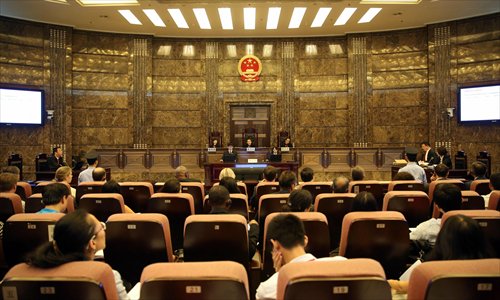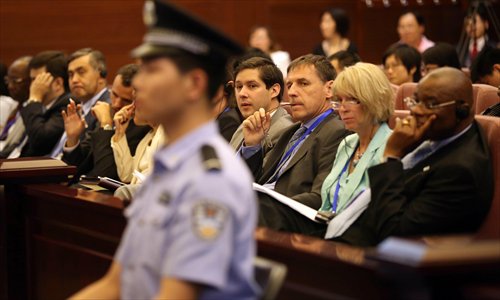Expats hope Chinese authorities make it easier for them to observe legal procedures


The Supreme People's Court invited envoys from 16 foreign countries to an open day to observe trials last August in Beijing. Photos: CFP
Getting permission to attend trials in China has long been very difficult for foreigners. However, the authorities have recently made some limited moves towards loosening these restrictions. Being invited due to personal connections or through using formal application procedures, dozens of foreign reporters, scholars and diplomats have recently attended courtroom hearings. They revealed that the experience helped them gain insights into the Chinese court system and the difficulties judges face.
Chinese judges have poor legal skills and they are unable to handle cases well - these were the impressions that Nils Pelzer, a German expert of procedural law, previously had of the Chinese judicial system.
But during his research in China, talking with judges and observing trials, he decided that this is not true.
"Many young judges and lawyers are extremely motivated and well-educated," Pelzer told the Global Times in a recent e-mail interview.
Pelzer, a research fellow at the Max Planck Institute Luxembourg for International, European and Regulatory Procedural Law, visited courts and attended several public hearings in China last year, when he was a visiting scholar at the KoGuan Law School of the prestigious Shanghai Jiao Tong University.
On June 11 last year, he, along with few diplomats and foreign reporters, was invited by the Supreme People's Court (SPC) to hear an investment dispute case between a Fujian Province-based waste recycling firm and its parent company registered in Singapore. It was reportedly the first SPC hearing that foreign diplomats were invited to attend.
In this case, the SPC overruled the verdicts handed down by local and provincial courts. Pelzer believes the outcome was satisfactory.
"The proceedings were skillfully led by the chief judge, and the quality of the debate between the Court and the lawyers of both parties was generally very high," he wrote in a commentary three days later on a blog discussing China's highest court.
Apart from the recycling firm dispute, Pelzer attended two other public hearings at lower courts in Guangdong Province and visited another court in Zhejiang Province without attending a hearing.
But it is extremely difficult to get permission to attend court proceedings without personal connections, Pelzer said. "This makes the process somewhat arbitrary and not very objective."
China has ruled that all foreigners with valid identification should be allowed to observe public trials. But in many cases, foreign diplomats and journalists complain that their applications to attend public hearings are rejected.
Many legal experts have been calling for the authorities to remove restrictions on individuals observing public trials, no matter if they are Chinese nationals or foreigners. Gao Yifei, professor at the Southwest University of Political Science and Law, is one of them.
"Opening trials to the public, including foreigners, not only increases judicial credibility, but can also help the world know more about the Chinese court system and minimize misunderstandings," Gao told the Global Times. "It can also display our confidence and dedication to judicial transparency."
Unclear restrictions
China has seemed to make efforts to show its trials to foreigners in the last two years. Last August, the SPC held another open day for foreign envoys, in which representatives of 16 foreign countries visited the court and observed trials.
"With the world becoming increasingly connected, Westerners are becoming more and more interested in the Chinese legal system, and this also includes the work of the courts," Pelzer said.
He noted that it is nowadays relatively easy to get access to China's laws, its courts' judgments and scholarly articles about Chinese law. But he and many others also want to understand how the system works in practice.
"This refers both to general cultural exchange and confidence of foreign investors in the court system," he said.
Nevertheless, attending hearings and visiting China's heavily guarded courts is not easy.
"Even Chinese citizens find it hard to attend hearings, let alone foreign nationals," Gao said.
Legal experts have noted a number of methods the authorities use to prevent people from attending hearings, such as choosing small courtrooms to limit seating capacity, not announcing trial dates in advance or requiring observers to acquire trial observation certificates from the court.
Raphaël Droszewski, First Secretary of the Political Section of the Delegation of the European Union to China, told the Global Times that their applications to observe public trials in China are usually rejected without explanation or, in some instances, they are told there are no seats left in the courtroom.
Pelzer said that he also tried to attend two cases in Shanghai and Guangdong, but the judges told him that it was too troublesome to get him permission and rejected his requests to attend the hearings.
There aren't any publically-known regulations that explain how a foreigner can apply to attend a public hearing. The Global Times' interview requests to the SPC went unanswered.
The only public file the Global Times could find is a reply sent to the Guangdong Higher People's Court by the SPC in 1982, which stated foreigners need to obtain approval from both the regional foreign affairs office and an upper level court to attend a hearing of a case in which all parties are Chinese. It said the courts need to "choose cautiously" which cases are opened to them.
"The courts usually select hearing attendees they favor, they don't choose in a random way," Gao said. "Such practice fails to uphold the people's equality before the law."
In addition, if more ordinary people and foreigners attend hearings, their observations and how they report on trials will be more comprehensive and convincing, he added.
Experience reality
In many foreign countries, citizens and foreign nationals can walk into courts and attend public hearings freely. Xu Xin, a law professor at the Beijing Institute of Technology, who has been calling for the abolishment of mandatory identification checks for those who wish to enter courtrooms, recently attended several hearings in Tokyo.
He said anybody, no matter their nationality or age can enter Japanese court buildings without showing identification. And they can walk into any courtroom during a public trial.
Gao said courts in the US, UK and Hong Kong Special Administrative Region also don't check people's identification before they enter either.
Pelzer said in Germany, foreign citizens can attend all hearings that German citizens are allowed to attend. "Under German law, it would be illegal and considered unconstitutional discrimination to deny foreigners access to courts," he said.
Some courts in China have gradually started to make changes.
The Sichuan Higher People's Court recently allowed several foreign diplomats and reporters to attend the hearings of the retrial of Li Yan, a domestic violence victim who killed her husband in 2010 and was sentenced to death in previous trials.
"We were pleasantly surprised when the Sichuan Higher Court called the EU delegation to inform us that we were allowed to observe this verdict hearing. Colleagues from France and Germany were also present," said Droszewski who attended the verdict hearing in April.
Didi Kirsten Tatlow, correspondent for The New York Times' Beijing Bureau, and a photographer, made it into a retrial hearing in November after making many telephone calls and sending faxes to different people in the provincial justice and foreign affairs departments over several weeks.
"In many years reporting from China I have tried many times to get comment from justice officials on trials or enquired about attending trials, but have never succeeded. The trial of Li Yan was the first time I gained entry in more than a decade of work here," she told the Global Times in an e-mail interview.
Tatlow said the experience has increased her understanding of the challenges Chinese courts face. Outside the courtroom, she was manhandled and verbally abused by the family of the man Li Yan killed. In the courtroom, they shouted obscenities and even threw shoes at Li Yan's lawyer.
"It is important to let foreign journalists experience what trials are really like in China, how they can be verbally and physically violent, and not to sanitize the experience. This too increases mutual understanding. China has many different kinds of challenges to building a good justice system, and greater openness will help," she said.
Worries about openness
According to media reports, some foreign diplomats have claimed that Chinese courts have rejected their requests to observe high-profile trials including the Bo Xilai case and hearings related to the July 5 riot in Urumqi, Xinjiang Uyghur Autonomous Region.
There are some worries among officials that opening these politically sensitive cases to foreign observation might risk leaking State secrets, defaming the country or arousing accusations.
Gao says that as long as trials are open to the public, there is no legal basis to exclude foreign from such hearings.
SPC regulations require all trials to be open to the public, except cases involving State secrets, privacy issues, minors or commercial secrets.
Pelzer said he understands Chinese officials' concerns, but he believes that openness can also be a sign of the strength of a country and its legal system. "I think everybody would profit from a more open system. Westerners would have more confidence in the Chinese legal system, and Chinese judges would realize that they bear comparison to their Western counterparts."
Gao argues that the main reason that Chinese courts are reluctant to be more open to the public is backward legal concepts. "Some judges and officials are arrogant; they value their status and power much more than the law. They are used to using political means to solve problems instead of the rule of law."
Jiang Huiling, vice director of the SPC's judicial reform office, has called on the courts to change their attitudes and enforce a more open trial observation system. He wrote in a commentary published in Caijing Magazine in 2013 that the courts usually create barriers, not convenience, for people to join hearings.
In July, an SPC official said at a press conference they plan to launch detailed measures for allowing foreigners to attend courtroom hearings later this year.
"That is wonderful news. I hope that court proceedings will be as open as possible. This would also help the court system as a whole to strengthen its position and also increase its reputation," Pelzer said.
Newspaper headline: Courts on trial